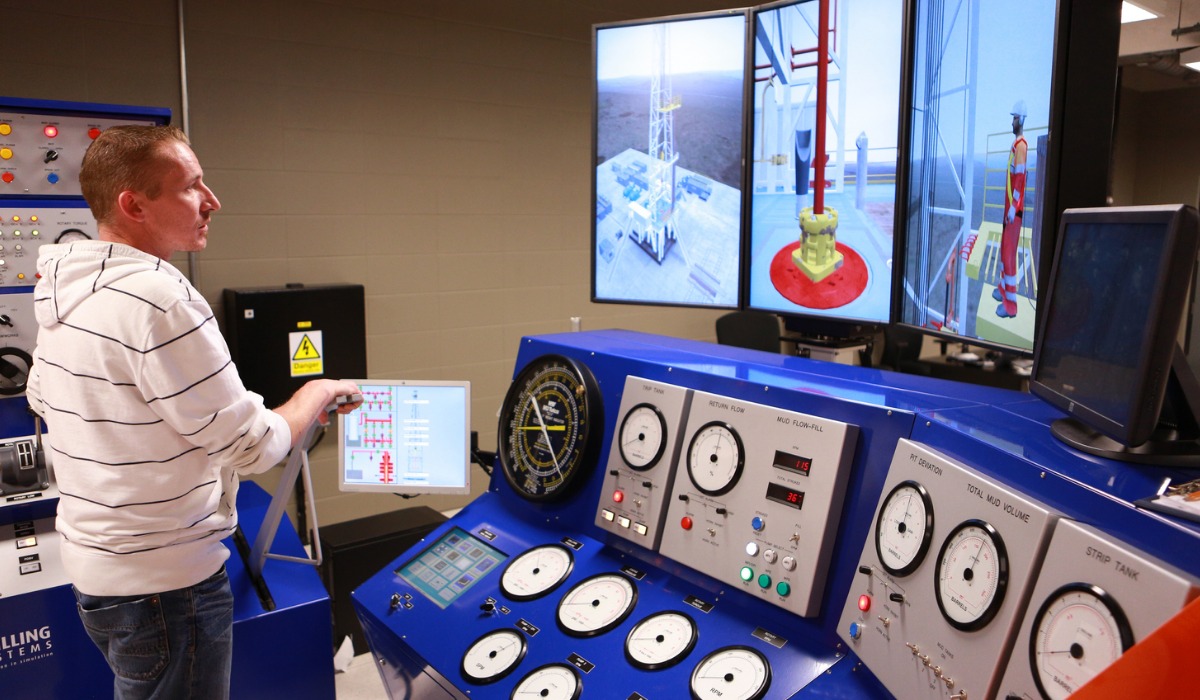Overview
The Non-Destructive Testing (NDT) Foundations program will equip you with the fundamental skills required to perform critical inspections that contribute to the safety and maintenance of various industries.
Using techniques that assess the integrity of materials and structures without causing damage, NDT technicians play an essential role in preventing potential failures and saving time, money, and lives.
Learn from industry professionals with extensive field experience. Gain practical experience with the latest NDT equipment and technologies. Benefit from job placement assistance and career counselling. Connect with a community of professionals and alumni in the NDT field.
As a graduate, you can look forward to a job market with high demand for qualified NDT technicians. Opportunities for travel and diverse work environments are available, with potential roles across Canada and internationally. Employment sectors include pipelines and refineries, transportation, utilities, construction, steel and other manufacturing, and maintenance.
The program combines theoretical courses with hands-on practical labs conducted on campus. The program duration varies depending on if you choose a full-time or part-time course load. This blended learning approach allows you the flexibility to manage other commitments while obtaining the necessary knowledge and skills that span the methods in the NDT field.
Enroll in the Non-Destructive Testing Foundations program today and take the first step towards a challenging and rewarding career in the inspection industry.
Non-destructive testing (NDT) technicians need:
- motor coordination and manual dexterity
- communication skills
- the ability to maintain focus in busy or noisy surroundings
- the ability to work independently, often with little supervision
- an aptitude for math
- strong attention to detail
- the ability to work flexible hours in varying locations
- the ability to physically maneuver a job site freely.
You should enjoy performing tasks precisely, analyzing and interpreting data and systematically approaching your work.
Graduates are prepared to undertake the three steps mandated by the Canadian General Standards Board (CGSB) for NDT certification in Canada:
- comprehensive training
- accumulation of work experience
- successful passing of CGSB exams.
This program specifically addresses the training component, setting a solid foundation for advancing to subsequent certification levels.
After successfully completing this program, you'll receive a SAIT Non-Destructive Testing Foundations certificate.
Careers and opportunities
Each year, SAIT conducts a survey between February and April to determine the employment rate, salary and satisfaction of our newest SAIT alumni.
![]() 72% graduate employment rate
72% graduate employment rate
![]() $63,000 average starting salary
$63,000 average starting salary
Find out more about our graduate employment statistics >
Our graduates may work in the following occupations. Some careers require additional experience and education.
Associated National Occupational Classification (NOC) codes: 21120, 22230, 22231, 22232, 94104.
Career planning support
Unsure which career path is for you? Here are some recommended career planning resources to help you decide your future.
You can also head to Alberta alis for lots of information about careers in Alberta, including quizzes and labour market information to help you narrow down a path.
Finally, you can take our online career finder quiz, which can help narrow your options based on your current skills and interests.
Courses
The Non-Destructive Testing Foundations certificate requires 16.5 credits (nine courses) to complete.
| Course | Credits |
|---|---|
|
Materials and Processes for NDT provides an overview of casting, forging and welding processes. Learners will discuss defects at various stages of processing and during service, defect detection, mechanical testing and heat treatments. |
3 |
|
This course explores and develops skills for public speaking and technical presentations. Students will focus on technical writing for reports. Students will also develop resume styles to assist them in their job searches. |
1.5 |
|
In this course learners are introduced to Visual Testing (VT) methods which allows technicians to locate defects in many materials. Learners work with various equipment and accessories and follow inspection procedures and standards outlined by industry and regulatory groups. |
1.5 |
|
In this course learners cover generation and properties of eddy currents, sensing element types, factors affecting the test system, instrumentation and applications. Eddy currents are based on a circulating electrical current induced in a conductive material by an alternating magnetic field. |
1.5 |
|
This course provides a basic foundation to Industrial Radiography for Non-Destructive Testing (NDT). Learners cover the physical principles of penetrating radiation, sources, detection, process and weld interpretation. They also focus on practical applications and theory for Level 1 CGSB certification. Radiation safety with x-ray tubes, required by the Alberta Government codes, is also covered. Equivalents:
|
1.5 |
|
Certified Exposure Device Operator is the first step in preparing learners for a career in Industrial Radiography. Learners will have the opportunity to review the basics of chemistry and ionizing radiation. The learner will also study safety, biological effects, radiation detection, emergency procedures, and procedures for the operation of exposure devices and Canadian Nuclear Safety Commission regulations. |
1.5 |
|
This course is a part of the NDT Inspection Foundations program. It covers topics which include: fundamental properties of sounds, wave propagation, generation of ultrasonic waves, test equipment and test methods. Instruction is provided in calibration, performance tests, weld inspection, specification and result interpretation. Learners must provide their own calculator with scientific functions, which they will use throughout the course. Equivalents:
|
3 |
|
In this course learners are introduced to Magnetic Particle (MPI) methods which allow technicians to locate defects in ferro-magnetic materials. Learners work with various equipment and accessories and follow inspection procedures and standards outlined by industry and regulatory groups. |
1.5 |
|
Liquid Penetrant Inspection (LPI) also referred to, as Dye Penetrant Testing, is a sensitive, inexpensive and very portable Non-Destructive Testing (NDT) method that is capable of detecting and locating discontinuities that are surface breaking. This method is an enhancement of visual inspection. Topics covered are Basic Principles of Liquid Penetrant Inspection and Processing, Advantages and Disadvantages of various processes, System Controls, Test Equipment and Accessories and Inspection Procedures and Standards. |
1.5 |
Progression
You must attain a PGPA and/or a CGPA of 2.0 or better each semester and pass the prerequisite courses to progress through the program.
To qualify for graduation, you must pass all courses, attain a CGPA of 2.0 or better and complete course requirements within the prescribed timelines.
Admission requirements
Applicants educated in Canada
Applicants must demonstrate English language proficiency and completion of the following courses or equivalents:
- Grade 10 Math, and
- Grade 10 English.
SAIT accepts high school course equivalents for admission for applicants educated outside of Alberta.
All applicants who were educated outside of Canada must demonstrate English language proficiency and provide proof they meet the program admission requirements outlined above with an international document assessment. Find accepted educational documents and assessment options.
SAIT may also accept courses completed at certain international post-secondary institutions.
Academic Upgrading
Missing an admission requirement for this program? Upgrade your prior education to help you receive admission into one of SAIT's career programs.
English language proficiency
All applicants must demonstrate English language proficiency prior to admission, including students educated in Canada.
Transfer agreements
At SAIT, we have created transfer agreements with partner institutions to allow you to earn course credits toward your SAIT program based on your previously completed credentials.
Transfer Alberta search tool
Use the Transfer Alberta search tool to see all transfer agreements between Alberta post-secondary institutions (including those with the University of Calgary, Mount Royal University and Bow Valley College.)
Search transfer agreements in Alberta
Transfer options for graduates
When you have completed this program, you may continue your education at a partner post-secondary institution. These transfer agreements include partnerships within and/or outside of Canada.
Available intakes
Spring 2026
Start dates:
- Domestic students: Open
-
-
Application deadline: April 30, 2026
-
- International students: Open
-
-
Application deadline: March 27, 2026
-
Fall 2026
Start dates:
- Domestic students: Open
-
-
Application deadline: June 30, 2026
-
- International students: Open
-
-
Application deadline: May 29, 2026
-
Costs
2025/26 tuition and fees
The following estimated costs are effective as of July 1, 2025.
The estimated total cost of tuition and fees is based on completing the program in one semester of study. Following a modified schedule will impact the fees you pay per semester and may alter final costs.
Domestic students
The program total is based on the estimated amount you will pay if you enter this program during the 2025/26 academic year. The program total amount listed on your letter of admission may appear higher. This amount is your maximum tuition guarantee for the program. SAIT will not exceed this maximum, regardless of changes in tuition and fees between academic years.
Books and supplies are approximately $500 per full-time year.
This is a bring-your-own-device program with a standard computer hardware and software requirement. See the specific requirements on our computers and laptops page.
Find your booklist on the SAIT Bookstore's website. The booklist will be available closer to the program start date. Can't find your program or course? The bookstore didn't receive a textbook list. Contact your program directly to determine if they're still refining course details or if you're in luck; no textbook purchase is required this term.
Required tools and personal protective equipment (PPE)
You will need:
- overalls
- steel-toe boots
- safety glasses.
We recommend waiting to purchase these until classes begin, as your instructors will discuss industry-approved PPE in class.
Your tools will be provided.
Financial aid
Paying for your education may feel overwhelming, but we have resources and programs that can help, including information about payment options, student loans, grants and scholarships.
Application process
Ready to apply?
Follow our step-by-step guide to submitting a successful application.
Communication during admission
Email is the primary source of communication during the selection process. Ensure your personal email account is managed appropriately to receive our emails, files and communications. We recommend you add the ma.info@sait.ca domain to your safe senders' list or you risk missing critical email messages.
Begin your application
Apply now using the online application portal.
Ensure you have a valid Visa or Mastercard to pay the non-refundable application fee of $120 for domestic applicants or $175 for international applicants.
Information sessions
Prepare for a strong start in your chosen program or get the details you need to decide your future path.
Our expert staff and faculty are ready to answer your questions and provide information about the following:
- What sets SAIT apart
- An introduction to the program and area of study
- Admission requirements
- Future career paths
- Information on the earning potential and graduate employment rates.
Contact us
School of Manufacturing and Automation Advising
-
Phone - 403.284.8641
-
Email - ma.info@sait.ca
International Student Advising
-
Phone - 403.284.8852
-
Email - international@sait.ca
Subscribe for updates
Your journey starts here! Sign up to get important updates on:
- Manufacturing and automation programs
- Application information
- Relevant news and events

Oki, Âba wathtech, Danit'ada, Tawnshi, Hello.
SAIT is located on the traditional territories of the Niitsitapi (Blackfoot) and the people of Treaty 7 which includes the Siksika, the Piikani, the Kainai, the Tsuut’ina and the Îyârhe Nakoda of Bearspaw, Chiniki and Goodstoney.
We are situated in an area the Blackfoot tribes traditionally called Moh’kinsstis, where the Bow River meets the Elbow River. We now call it the city of Calgary, which is also home to the Métis Nation of Alberta.




